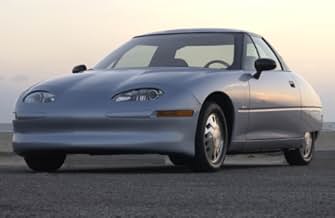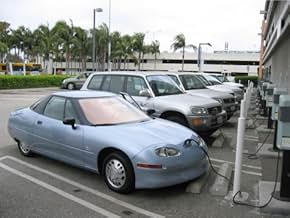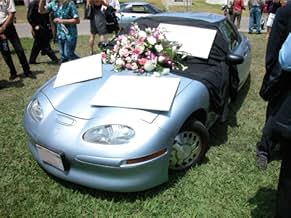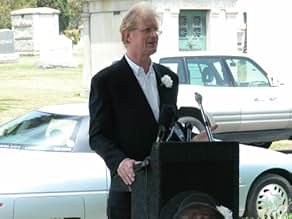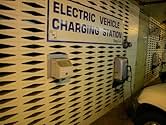AVALIAÇÃO DA IMDb
7,6/10
13 mil
SUA AVALIAÇÃO
Um documentário que investiga o nascimento e morte do carro elétrico, assim como o papel das energias renováveis e da vida sustentável no futuro.Um documentário que investiga o nascimento e morte do carro elétrico, assim como o papel das energias renováveis e da vida sustentável no futuro.Um documentário que investiga o nascimento e morte do carro elétrico, assim como o papel das energias renováveis e da vida sustentável no futuro.
- Direção
- Roteirista
- Artistas
- Prêmios
- 4 indicações no total
Martin Sheen
- Narrator
- (narração)
Reverend Gadget
- Self
- (as Greg 'Gadget' Abbott)
David Freeman
- Self
- (as S. David Freeman)
Frank Gaffney
- Self
- (as Frank J. Gaffney Jr.)
Avaliações em destaque
10lise-36
Director Chris Paine is no dummy. As a onetime owner of an electric car (the EV1) and a savvy filmmaker, he has quadruple checked his factsand they are alarming. Although the electric car obviously depends upon coal or oil for its power, electricity is far cleaner than gasoline in the long run with less carbon output. Additionally, the batteries are recyclable, and electric cars make fewer demands in other environmental ways: There are no oil changes, oil filters, spark plugs and other parts and services that conventional autos require. Each of these parts carries its own environmental cost.
See this film. It has nothing to do with the current price of gas and everything to do with corruption on many levels.
See this film. It has nothing to do with the current price of gas and everything to do with corruption on many levels.
As a former engineer with both GM and Ford, I have to thoroughly refute what a previous commenter has stated about likely explanations. With the technology of the powertrain/fuel source development that far along, that far advanced within a viable vehicle, crash-safety and equipment regulations would not have removed this from the marketplace. The "skin" and tub/framework of the vehicle would have been either reworked to comply or the powertrain/fuel source would have been adapted to fit existing car lines that meet crash-safety and equipment regulations. There are plenty of examples of "hurry up" retro-fits in Detroit/Dearborn's history. Unfortunately there is much documented history of technology being quashed, patents being bought and buried, innovations left by the wayside to discourage change, discourage having to retool, reinvent, reinvest...and if you don't think that auto/oil/gov are all complicit in this, how naive can one be? GM and the railroads, the Tucker, fuel injection, Wankel engine, anti-lock brakes...all quashed by powerful companies and people not wanting change no matter what the benefit would be in safety, society, or the environment.
10joeytino
This film WILL frustrate you greatly. It's that simple. All of this talk about cars of the future with hydrogen fuel cells in 15 or 20 years from now is ridiculous. The car of the future was here, and they killed it. I won't say the first cars were perfect, but remember that NASA blew up a lot of rockets before getting it right, same with electric cars. The first ones could only do approx 80-100 miles on a charge. Most of us only commute that far to work, and these cars would have served us perfectly. Without one drop of gas. Battery technology has improved tremendously since then, and even while the EV was in production there were improvements. Mr. Paine presents a surprisingly balanced film that time and again exhibits mans' greed, stupidity, shortsightedness and another excellent example of American corporate stupidity. I firmly believe that General Motors would not be in the financial hole it is currently in if it continued exploring the electric car program. You have to start somewhere and GM, Ford, Toyota and Honda were the trailblazers and they all did it. Electric cars were built that not only worked, but worked well, and only would get better as battery technology improved. They did it because the State of California forced them to. The automakers pushed back and California blinked. It's no wonder that shortly thereafter all of the electric car programs were killed and the quiet destruction of most of the cars began. Some survived and are still in use. (An electric Toyota RAV4 sold on eBay in April 2006 for $60,000.) This film is successful not because of a political leaning one way or the other, but because of the flagrant lack of common sense on display by most parties, and on that level it's extremely frustrating because we have the technology to start reducing our dependence on oil now.
I think this movie is wonderful. Can't understand the low rating on this site so far--I really wouldn't be surprised if those individuals and industries who stand to lose profits from the revelations of the movie, have voted negatively to artificially reduce its average rating on this well-known site. I mean, jeez, the movie hasn't even debuted yet (I saw an advanced screening)! And already it's only at a four-something? C'mon! Since I leased and drove an EV daily for three years(until it was rear-ended), I feel I'm in a good position to realistically evaluate the movie. Let's face it, it's a story that needs to be told. These issues impact everyone, since everyone is affected by air quality, unstable foreign politics, gas prices, transportation, and (lack of) consumer choice. EV technology is here, now. Unlike the fuel cell, which is perpetually 10 years in the future. Why was it taken away from the consumers who wanted it? Why does our society not promote the mentality that multiple solutions (EVs, fuel cells, hybrids, bicycles, mass transit, increased fuel economy, etc. etc.) all need to be employed to attack our problems with pollution and dependence on foreign oil? Why are there all these myths that the electric car is undesirable and not viable? Consumers and policy makers need to know this story.
As a driver who lived and followed the story, I think the movie does a bang-up job of revealing it. The movie begins with a historical look at the development of the electric car, what factors discouraged it back then, what brought it back to life in the 1990's, its amazing features, and why it is no longer available to consumers as a production vehicle. (conversion kits only, folks!) The movie is filled with history, politics, technology, innovation, and some very interesting personalities. It's woven together well and is smooth and fascinating. Even though it's a documentary, it will not put you to sleep! Go on--go see it. Even if you don't agree with it, you won't regret it. We all have a responsibility to be more active with these issues, and in the meantime it's a fascinating story.
As a driver who lived and followed the story, I think the movie does a bang-up job of revealing it. The movie begins with a historical look at the development of the electric car, what factors discouraged it back then, what brought it back to life in the 1990's, its amazing features, and why it is no longer available to consumers as a production vehicle. (conversion kits only, folks!) The movie is filled with history, politics, technology, innovation, and some very interesting personalities. It's woven together well and is smooth and fascinating. Even though it's a documentary, it will not put you to sleep! Go on--go see it. Even if you don't agree with it, you won't regret it. We all have a responsibility to be more active with these issues, and in the meantime it's a fascinating story.
How can you fit decades of events into two hours? And, not appear to have an agenda? Mr. Paine and his crew did a good job creating a synopsis of the events affecting the Electric Vehicle, and its subsequent effect on us as a society. He also more clearly outlined why we should pay more attention to the EV, and how it played such a key role in the history of our country.
The main thrust of this movie is to educate the public about the actions of key players in shaping our society through their policies on transportation and energy, and how powerful those policies have proved to be in affecting us as a nation. I came away with a better understanding of what I had only guessed at before, and I am very glad that Mr. Paine chose to give the concern-inspiring events first but leave us with a sense of optimism for the future.
The only fault I can find with this movie is that it necessarily has to cover a lot of factual information, something that makes it a lot like reading a good book, rather than viewing a movie. But, if it makes you take a good look at why we're paying over $3/gallon for gas, then it's a good book indeed.
The main thrust of this movie is to educate the public about the actions of key players in shaping our society through their policies on transportation and energy, and how powerful those policies have proved to be in affecting us as a nation. I came away with a better understanding of what I had only guessed at before, and I am very glad that Mr. Paine chose to give the concern-inspiring events first but leave us with a sense of optimism for the future.
The only fault I can find with this movie is that it necessarily has to cover a lot of factual information, something that makes it a lot like reading a good book, rather than viewing a movie. But, if it makes you take a good look at why we're paying over $3/gallon for gas, then it's a good book indeed.
Você sabia?
- CuriosidadesThe boxy, small EV shown being crushed in the movie was the Honda EV-Plus. They, like the sleek GM EV-1, were only available for lease; several returned to Honda, and were converted into fuel cell demonstration vehicles. For a while, you were able to lease them through EV Rentals (at several Budget Rent a Car locations).
- Citações
Mel Gibson: Who writes the history? Um, well... The guy with the biggest club.
- Trilhas sonorasJane's Theme
from 13º Andar (1999) (as The 13th Floor)
Composed by Harald Kloser
Courtesy of Centropolis Entertainment
Principais escolhas
Faça login para avaliar e ver a lista de recomendações personalizadas
- How long is Who Killed the Electric Car??Fornecido pela Alexa
Detalhes
- Data de lançamento
- País de origem
- Central de atendimento oficial
- Idioma
- Também conhecido como
- Who Killed the Electric Car?
- Locações de filme
- Empresas de produção
- Consulte mais créditos da empresa na IMDbPro
Bilheteria
- Orçamento
- US$ 1.000.000 (estimativa)
- Faturamento bruto nos EUA e Canadá
- US$ 1.678.874
- Fim de semana de estreia nos EUA e Canadá
- US$ 45.138
- 2 de jul. de 2006
- Faturamento bruto mundial
- US$ 1.764.304
- Tempo de duração
- 1 h 32 min(92 min)
- Cor
- Mixagem de som
- Proporção
- 1.75 : 1
Contribua para esta página
Sugerir uma alteração ou adicionar conteúdo ausente


